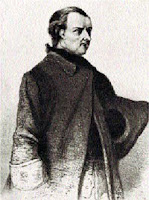Power
 "Here the generality of the people is embodied in the State. Here I can affirm with perfect reason: I-am-the-State, since the people have made me their supreme potestate" (166)
"Here the generality of the people is embodied in the State. Here I can affirm with perfect reason: I-am-the-State, since the people have made me their supreme potestate" (166)In the first and last instance, I the Supreme is a novel about power. As we have seen, the title itself is a declaration of power and authority: power is here made to speak, performatively. The first person declares himself to be first among the equals that constitute the republic in a relation of apposition that is to go without saying, for "I, the Supreme" presupposes the initial foundation "I am the Supreme." This foundation is to be taken for granted; the Supreme insists that he (and only he) has the right to speak as supreme authority. He is the state.
But as we have seen, the novel also revolves around the fact that the parody found pinned to the cathedral door threatens to undermine this assumption of supreme power. It would seem that somebody is attempting to usurp the Supreme's right to absolute authority by forging his authorship of state decrees. Hence the book threatens to undo the assumption contained within its title, and the Supreme finds himself forced to justify and so (re)legitimate his place as head of state. The novel unfolds as an anatomy not only of power but also of (potential) counter-powers.
The dictator reasserts his right to supreme authority not only through repression but also by narratively re-enacting the history of the state's coming into being, its struggle for independence first from Spanish rule and second from the threat posed by the neighboring states of Argentina and Brazil. Thus the Supreme re-tells the story not only of the battles but also (more importantly from his standpoint) of the negotiations in which he played a key part in maintaining Paraguay's autonomy as the various parts of what was previously the Spanish Empire reconstituted themselves as sovereign nations. The establishment of Paraguayan sovereignty is represented as a process that is both material and discursive, a question of force and persuasion. Even the most absolute of dictatorial powers feels the need for discursive legitimation.
We should note particularly that the discourse to which the dictator has recourse establishes Paraguay as a distinctively modern state, and thus the Supreme's power as a specifically modern power, in so far as his narrative is one that invokes the people as the source of legitimate power. Rather than the divine right that was invoked to justify monarchical power, the Supreme appeals to the notion of a social contract as elaborated by the French philosopher Jean-Jacques Rousseau. Indeed, he signals that he is more modern than the Argentina delegation who come to Asunción with their talk of power politics and pragmatics. He is frustrated that there is not more opportunity to talk further about the principles of political philosophy and their adaptability to the nascent American republics: "I would have liked to discuss at that moment the principles of the Social Contract as applied to our countries" (205). Paraguay was, after all, the first Latin American republic, and the Supreme's concern is in part how to found this new type of regime from the ashes of a discredited Empire.
Rousseau's notion of the Social Contract is an attempt to legitimate the State through reason and consent, rather than tradition (or theology). A newly independent Paraguay has no republican tradition on which it can draw (and has turned its back on the church). All that remains is reason, and it is important to recognize therefore that the Supreme is a profoundly rational man in so far as his power is founded upon reason's dictates. This is so even as and when we see his reason dissolving or becoming unreasonable. We should still see that his attempts to consolidate his power have also to be presented at attempts to ward off the irrational. And after all, in so far as his power is undercut, it is never by reasoned argument, but rather by parody, multiplicity, or material decay (of either his body or his text).
What we have, therefore, is a hyper-politicized version of Borges's concern with the limits of reason. In the person of the Supreme, the Borgesian preoccupation with reason and order is immediately also a concern with the legitimation of the social. The crisis that afflicts the dictator (and if this is a novel about power, it is also a novel about power in crisis) concerns the extent to which not only his will but also rationality itself can be imposed upon a recalcitrant world. There is an echo of Hamlet, here quoted in the dictator's conversation with the Robertsons--"There's a Divinity that shapes our ends, / Rough-hew them how we will!" (129). The Supreme's wager is that he can invoke a republican power that supersedes the things of heaven and earth: "I am the final judge. I can decide how things will go. Contrive the facts. Invent the events" (196).
In a sense, then, dictatorship is presented not so much as the power of the individual counterposed against that of the people, for the people, the State, and the individual are a single entity incarnated in the body of the people's supreme representative; rather dictatorship here involves the attempt to assert the power of reason over that of history.
No comments:
Post a Comment